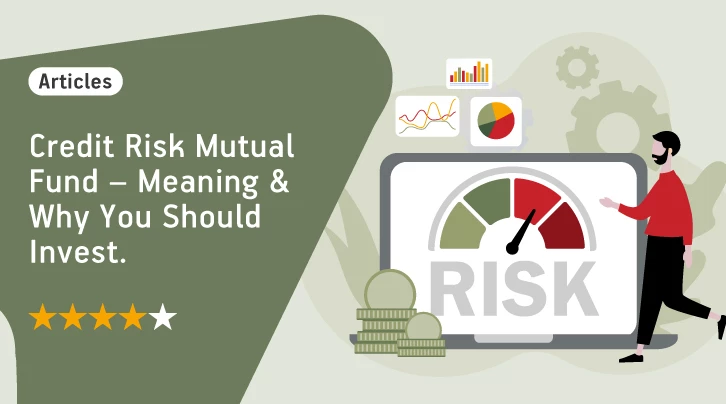While debt funds are potentially less risky than equity mutual funds, they’re not risk-free. For instance, credit risk is one of the primary types of risk in these schemes. Also known as default risk, it refers to the risk of interest or principal default by the security issuer.
Thus, to help investors make informed decisions, such debt securities are rated from AAA to D by rating agencies like ICRA and CARE in India. The higher the rating of the security, the potentially lower the credit or default risk.
But why would anyone want to invest in risky securities with lower ratings?
To potentially generate higher returns.
Lower-rated securities are riskier but tend to offer higher interest rates. Credit risk funds invest in such low-rated corporate bonds to generate potential returns for the investors.
Here are 4 things you should know about credit risk mutual funds-
1. What is Credit Risk Mutual Fund?
As per SEBI guidelines, a credit risk fund is a type of debt fund that invests at least 65% of the portfolio in AA and below-rated corporate bonds. Compared to higher-rated government bonds, corporate debt, etc., these lower-rated securities selected by credit risk funds offer higher interest rates. But they also carry a higher level of risk as the chances of default are higher.
While these schemes are not ideal for conservative investors, experienced investors looking for potentially higher returns can consider investing in these funds. Unlike Corporate Bond Fund, which invests 80% or more in AA+ and above-rated corporate bonds, credit risk funds invest predominantly in AA+ and below-rated bonds. The bond issuer rewards the investor for taking more risk by offering a higher interest rate.
2. How Do Credit Risk Mutual Funds Work?
As stipulated by the SEBI, the manager of a credit risk fund lends a minimum of 65% of the scheme's total assets to borrowers rated AA and below. Since the securities have a lower rating, the borrowers pay higher interest on the borrowed amount. As a result, credit risk funds can potentially deliver higher returns amongst debt funds.
While the rating of such securities can be upgraded in the future, which might positively influence the scheme’s NAV, it could also be downgraded further. So, invest responsibly according to your risk appetite.
3. Why You Should Invest in Credit Risk Funds?
Here are some of the reasons why you should consider investing in credit risk mutual funds-
Potentially Higher Returns
As these schemes invest in lower-rated securities, the investors are rewarded with higher interest rates for the risk taken.
Also Read : What is a Debt Fund?
Tax Efficiency
As credit risk funds are debt funds, STCG from the scheme is added to the investor’s taxable income, and LTCG is taxed at 20% after indexation. This can prove tax-efficient for investors, especially in the 30% income tax slab.
Ideal for Medium-Term Investment Tenure
Investors with an investment horizon of 3-5 years or more can consider investing in credit risk funds. This allows the fund to ride through short-term volatilities in the bonds held by the fund
What are the Things You Should Check Before Investing in Credit Risk Funds?
Now that you know credit risk fund meaning, check out the factors you should consider before investing in it-
Scheme AUM
Assets Under Management (AUM) is the market value of the securities held by a mutual fund scheme. When investing, prefer credit risk funds with a larger AUM as it provides fund managers more flexibility to diversify and reduce portfolio risk.
Diversification
Avoid credit risk schemes with significant lending to a single or a few related entities, as they have a higher risk of default. Check the scheme’s portfolio and ensure it is well-diversified.
Fund Manager and Fund House
Fund managers have a critical role to play in the performance of credit risk funds. Before investing, thoroughly analyse the past performance of the scheme’s manager and choose a reputed fund house.
Generate Potentially Higher Returns with Credit Risk Funds
If you don’t mind a higher level of risk to generate potentially higher returns, a credit risk fund can be a good addition to your portfolio. But if you are just starting with mutual fund investments, clearly understand what is a credit risk fund, how it works, and the risks involved before investing.
You can also discuss your investment goals with a professional investment advisor to create a financial plan that aligns with your needs and expectations.
Mutual Fund investments are subject to market risks, read all scheme related documents carefully.






 1800-270-7000
1800-270-7000




